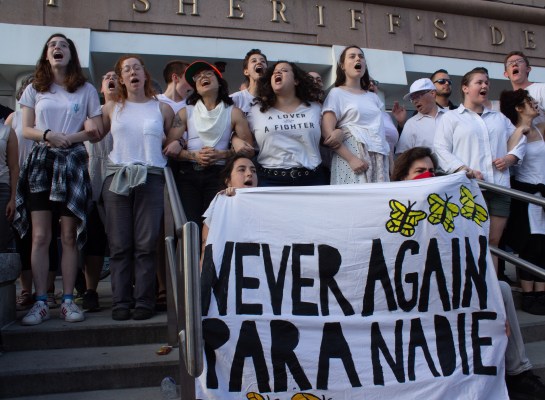Immigration may not seem to be a tech issue. But for Americans with some personal or family experience with the idea of separated families and/or concentration camps, it can be hard to see what is currently going on in our names thanks to the U.S. Immigration and Customs Enforcement agency (better known as “ICE”) as anything less than the single most urgent moral or ethical issue in this country today.
This begs a disclaimer: I have Eastern European Jewish family roots in what became the Holocaust. I have a Cuban Jewish mother who came to this country by herself as a young girl refugee and was separated from her family for multiple years due to U.S. immigration policy.
I am a father myself. This piece is personal for me, in other words. If you want to know whether I can be objective here, I would have to admit that seeing repeated images of thousands of children, as young as 4 months old, facing inhumane and abusive conditions in my government’s name and supported by my tax dollars, has been quite possibly the most morally disturbing experience of my life.
Still, given that I write specifically about the ethics of technology here at TechCrunch, is this topic “a fit” for this column? Well, “fortunately,” if not for me or any of us personally, then at least regarding my desire to write up ICE for this column: the Silicon Valley tech industry has a long and deep history of entanglement with undocumented immigrants to this country. And in fact, “thanks” to tech companies such as Palantir, Wayfair, and Amazon Web Services and their present-day collaboration with ICE and its concentration camps, tech and immigration ethics is very much a live topic for today.
It’s also a disturbing and depressing topic. Which is why I’m hoping to offer some hope, by concentrating not only on camps and detentions, but more on a series of innovative and impactful recent protests, in which tech companies played leading roles — both as objects of criticism in some cases and as helpful resources for the critics in others.
First, let’s focus on Palantir. As Manish Singh wrote in TechCrunch in May, “Immigration and Customs Enforcement documents, obtained by advocacy organization Mijente through Freedom of Information Act litigation, note that agents of ICE’s Enforcement and Removal Operations used Palantir’s software to build profiles of immigrant children and their family members for the prosecution and arrest of any undocumented person they encountered in their investigation.”
In other words, along with beds from multibillion-dollar furniture unicorn Wayfair, and web hosting from Amazon, the Peter Theil-funded Palo Alto software power is making this country’s showdown over immigration actively about the tech world, and this Monday, July 8, hundreds of protestors went to Palantir’s offices as part of a week of coordinated activities nationwide.

As Mijente campaigns director Priscilla Gonzalez told me, “We noticed the escalation of ICE operations, their invasions of homes, workplaces, and communities, and we began investigating just how people were being monitored and tracked like never before.”
Gonzalez continued, “We found that Palantir’s software allows ICE agents to build profiles of undocumented immigrants filled with personal information like their home address, work address, financial information, social media profile, and more. Palantir is the reason ICE has been able to accelerate its operations, conduct mass raids and rip families and communities apart.”
While it remains to be seen whether such protests will persuade Palantir to drop their contracts with ICE, what is clear is that the trend of staging significant protests against such institutions is only going to grow, as more and more grassroots groups, students, tech workers, faith leaders, elected officials, and others unite to hold them accountable.
Which brings me to my interview for this week.
A few days before the Palantir protest, and less than a week after an employee walkout from the Boston headquarters of Wayfair also drew hundreds of employees and supporters, another major ICE protest took place in Boston. This time, on July 2nd, it was a group of Jewish activists collaborating with Movimiento Cosecha, an organization representing undocumented immigrants.
Echoing yet another protest just a day earlier in which 36 Jewish activists were arrested while protesting an ICE facility in New Jersey, while carrying banners imploring “Never Again Para Nadie” (for no one), in Boston 18 protestors were arrested in similar fashion (multiples of 18 are culturally and religiously significant in Jewish tradition). While the Boston protest was not specifically tied to the tech industry, it was a moving — and telling — example of what tech companies might begin to expect if they continue involvement with ICE.
One of the arrestees in the Boston protest, moreover, was someone I had already been hoping to interview for this column — the nationally renowned sexual ethicist, author, and activist Jaclyn Friedman. As you will see below, Friedman has a lot to say about the intersection of sex, ethics, and tech. She insisted, however, that this interview focus almost exclusively on the ICE protest and the ethical issues behind it. I think the resulting conversation was powerful and educational.
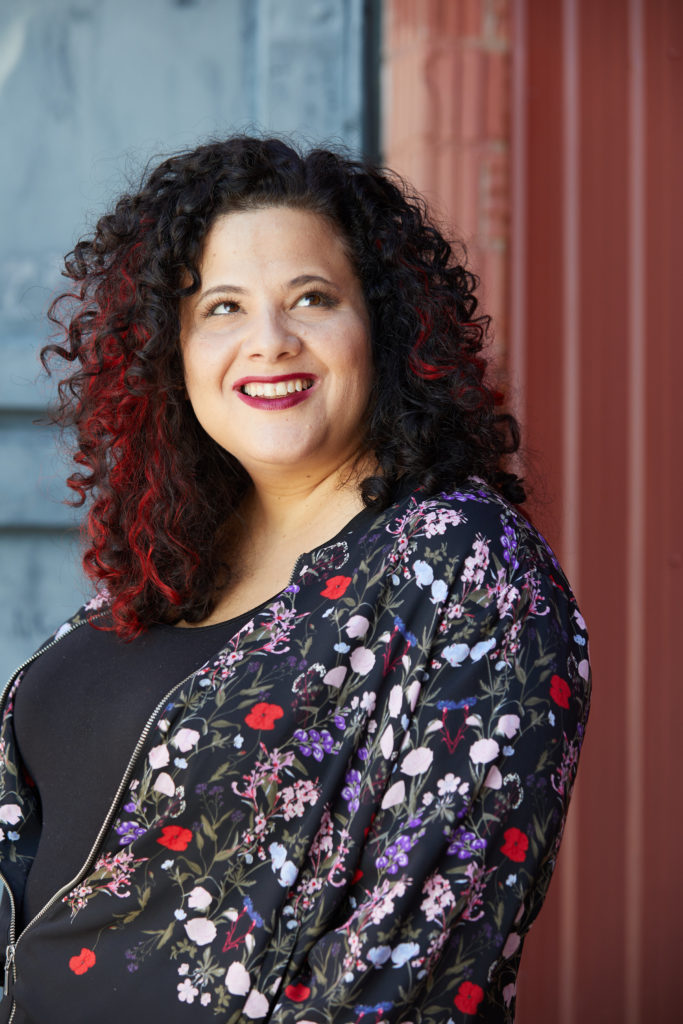
Greg Epstein: I know you through your work as an expert in sexual ethics, and I’ve been wanting to interview you about work you’ve done on the intersection of sex, ethics, and tech. But then I saw you’d participated in this — what I think may have been a landmark protest — and I had to talk with you about it. Given your background, what led you to participating in this protest?
Jaclyn Friedman: I certainly can and will make connections between what we just did with the Jews Against Ice action [and] sexual ethics, but I honestly just came to it as a human person, and as a Jew who’s just panicked and outraged, and felt a strong need to do something more. This action appealed to me as a Jew, because my activism stems from my Judaism.
That’s where I learned about social justice, where I get the fire in my belly, both in terms of Jewish teachings about tikkun olam, as well as, it just happened the Temple I grew up in was led by the first woman ordained in the modern era, Sally Priesand. [She] was, before I even knew the word feminism, my first feminist role model.
But also obviously the US is running concentration camps, and it’s impossible for me to not take that personally as a Jew. It certainly has everything to do with my work on sexual ethics which is functionally work about bodily autonomy.
If you’re talking about mass incarceration, that’s an issue about bodily autonomy. If you’re talking about concentration camps, it’s certainly an issue about bodily autonomy, and that’s even before we start talking about the amount of sexual assault and molestation that has been allowed to be perpetrated by the folks who are running these detention camps.
Epstein: Could you give a quick explanation of what exactly you mean by bodily autonomy, and why it’s important?
Friedman: Sure. I don’t think that any of us is free if we don’t get to say what happens and doesn’t happen with our bodies. It’s a basic human right: is the ability to be sovereign over ourselves.
Epstein: The term “Never Again” was the central slogan of the protest in which you participated, and of over a week of related activities which included a protest of the tech company Palantir. I am personally not religious in a traditional sense; I’m a humanist and a secular Jew.
I didn’t grow up with a big sense of traditional religiosity either. But for me, “Never Again” is the phrase and idea I’ve most associated with being Jewish all my life. It’s still very important to me. When you think about the idea of “Never Again,” what does that bring up for you personally?
Friedman: I think about the number of times I was caused to watch [the 1985 Claude Lanzmann documentary] “Shoah” as a kid. And listen to stories about the Holocaust generally. I almost hit a point of boredom or annoyance as a kid.
Not that I thought that the Holocaust was no big deal, but there was definitely a sense I had then, like, I get it. I get it. No one wants to do the Holocaust again. Surely humanity sees it was a terrible idea. Why are you saying this over and over again?
I also think about being 15, and visiting Dachau. I don’t know if you’ve been—
Epstein: I’ve been to Auschwitz and Birkenau, and a number of other places.
Friedman: The way you experience it is very determined by the setup. There was one path through: you had to go through the museum first and understand the story of what had happened there and then there was one path through the grounds.
At the very end you got to the ovens, and I remember this “click” moment, where there was this American couple ahead of us, and one said to the other, “Smile.” Taking a picture in front of the ovens.
[That] moment was a lightning strike, like, this is why everyone says “never again.” Because these people can have experienced everything I just experienced, and want to smile for a picture in front of the ovens.
Then, watching the 2016 Republican convention, this sort of orgy of fascistic signifiers and rhetoric, [I thought,] this is now. That was my first time like, oh no. This could happen here.
And as I say that I have to be aware, it’s happened here. There were concentration camps for Japanese people. The US has committed mass atrocities before. But in terms of my connecting that with the phrase “never again,” that’s been my process.

Image via Getty Images / nadia_bormotova
Epstein: There’s been some controversy around the use of the phrase, “concentration camp,” a lot of it generated by people who are not interested in understanding your perspective. But for anybody who might simply not be aware of the historic nuances, in the holocaust there were concentration camps and then there were death camps, extermination camps.
No one claims the United States and its immigration services have instituted death camps that are burning immigrants en masse, as the Nazis did to Jews and others in the Holocaust. However, the term concentration camp refers to a level of incarceration and violation of bodily autonomy that is literally currently taking place.
Friedman: It is really literally taking place. And I have so little patience for people who would rather argue about the terminology than talk about the mass atrocities being committed in our name.
Epstein: Agreed. I want to ask you to spend some time giving the details of your arrest, because taking that step can seem like a mysterious process for anyone who hasn’t ever tried it. I’d like my readers to be able to imagine themselves going through this, and perhaps consider what might motivate them to do so in the future.
So let’s talk a bit about your experience: was this your first time being arrested in a protest?
Friedman: It was my first time being arrested for any reason.
Epstein: Walk me through it, please?
Friedman: I saw somebody post on social media about this week of protests Jewish activists were planning. As we just discussed, my outrage feels very specifically Jewish, [so] it was appealing to me.
Not like I’m not doing other kinds of protests, but this felt particularly appealing to me. And there was a form you could fill out that said, ‘what are you willing to do?’ and a box you could click, [saying] ‘I’m willing to participate in civil disobedience that might risk arrest.’
The only reasons I could think to not do that were that it was scary, and would take a lot of time, and neither of those seemed like valid reasons for me right now. So I clicked the box.
We had training on Sunday: four hours of training on the history of non-violent protests, the philosophy behind it, and a lot of technical, legal stuff. Making sure we knew what we were getting into and were prepared.
We also got to know each other, [getting ready] to take this giant risk together. Then Tuesday we just went to the march. The rally was so powerful: amazing speakers and stories and singing and praying, and the shofar. It was really emotional.
Epstein: You marched past the Boston Holocaust Memorial, right?
Friedman: The march started at the New England Holocaust Memorial, which for folks who haven’t seen it, is a gut-punch of a memorial. It’s six towers, each representing one of the six major camps. It’s built with glass panes, and on the glass panes are etched six million numbers.
You can walk through the bottom of those towers and look up through them. As we did that, I felt I was honoring them by what I was doing.
The march wound through Boston and culminated at the South Bay Detention Center, where ICE detains immigrants in Boston. ICE rents space there, basically, from the sheriff’s office. At the end of the march, the 18 of us who had decided to take this particular risk, linked arms, singing this great protest song that had been written specifically for this set of protests.
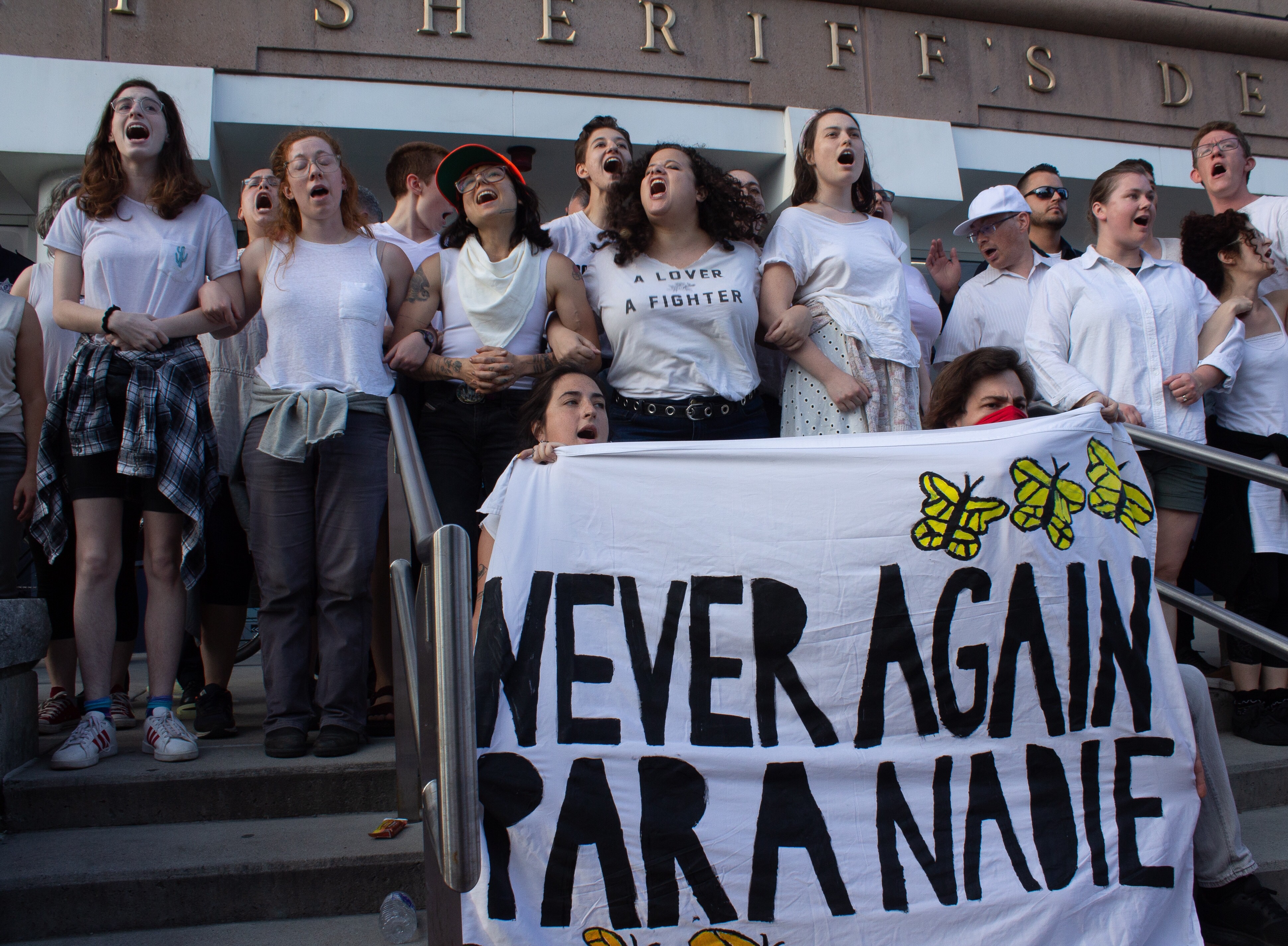
Two days beforehand, 36 people were arrested in a [coordinated and] similar protest in Elizabeth, New Jersey, and we knew that there were going to be ones taking place throughout the week.
Our original goal was to try to go inside the lobby of the detention center, but six or eight police officers were standing in front of the detention center and indicated we could not pass. We’d all agreed in advance we were not going to resist arrest or do anything provocative with the police, so we sat down right in front of them on the front steps, and there was a closing rally of the march. Then we each stepped up onto the top step, the line we were not allowed to cross, and were arrested.
Epstein: What did that mean for you?
Friedman: It meant I don’t recognize [ICE’s] authority. If they [are] going to continue to run concentration camps, we’re going to disrupt them at every turn. I want the cost of this policy to be too high for them to bear. Forcing them to deal with us bodily is a way of literally making them pay.
Epstein: What was your experience of being arrested?
Friedman: We were arrested by the Sheriff’s office, because the Sheriff runs that building. So we weren’t literally arrested by ICE, just because that’s how it works there. But [at the rally] we encountered folks who were detained, at the detention center. They were at the windows waving to us, indicating they could hear us and they were feeling us. That felt so powerful.
When we were arrested, there were 15 of us that the police identified as female, and three men, and we got separated by those gender lines. The 15 of us were taken to a precinct in South Boston together and put in a holding cell together until we could each be individually processed.
Then we were put into smaller cells, three to a cell, until we were all processed, because they wouldn’t release any of us until we were all processed, which was late into the night. I think the last person got out at four in the morning.
Epstein: Seems worth underlining the degree to which this was women-led.
Friedman: Absolutely. I was proud for it to be led by women and non-binary people. One news story said it was 15 men and three women, and I was irate. How do you make that error?
So we had each other for company. When we were all in the holding cell together, and in our smaller cells, we still could communicate with each other, and we had a couple of other people in the cells. But they kept us zip-tied until they’d processed each of us, which meant some people were in those zip-ties for eight hours.
Epstein: Painful.
Friedman: I don’t like to complain because we were treated like royalty compared to the folks in the concentration camps, but the royal treatment, when you’re incarcerated, is still really bad.
Epstein: Many of the participants in your protest and similar protests have spoken about how they went in there with white privilege, and had it infinitely better than the people on whose behalf they’re protesting— that could be an interesting example you’ve set for others in a similar position.
I want the elite Silicon Valley leaders who might be reading this piece to be able to picture themselves in the situation and investigate the degree to which they can identify with you and the degree to which they can conceive of being in your shoes. Would they do this too? What would it look like for them to do so?
Friedman: While we’re talking about bodily autonomy, as a survivor of sexual violence, it was not a small thing for me to voluntarily cede my bodily autonomy to men with guns and cells and legal impunity. It was… it’s something I’m still emotionally processing. I’m a pretty fierce defender of my own bodily autonomy.
The hope is that becoming willing to take this risk, and demonstrating that it’s this serious, will shake other people’s consciences awake. It’s going to take so many of us.
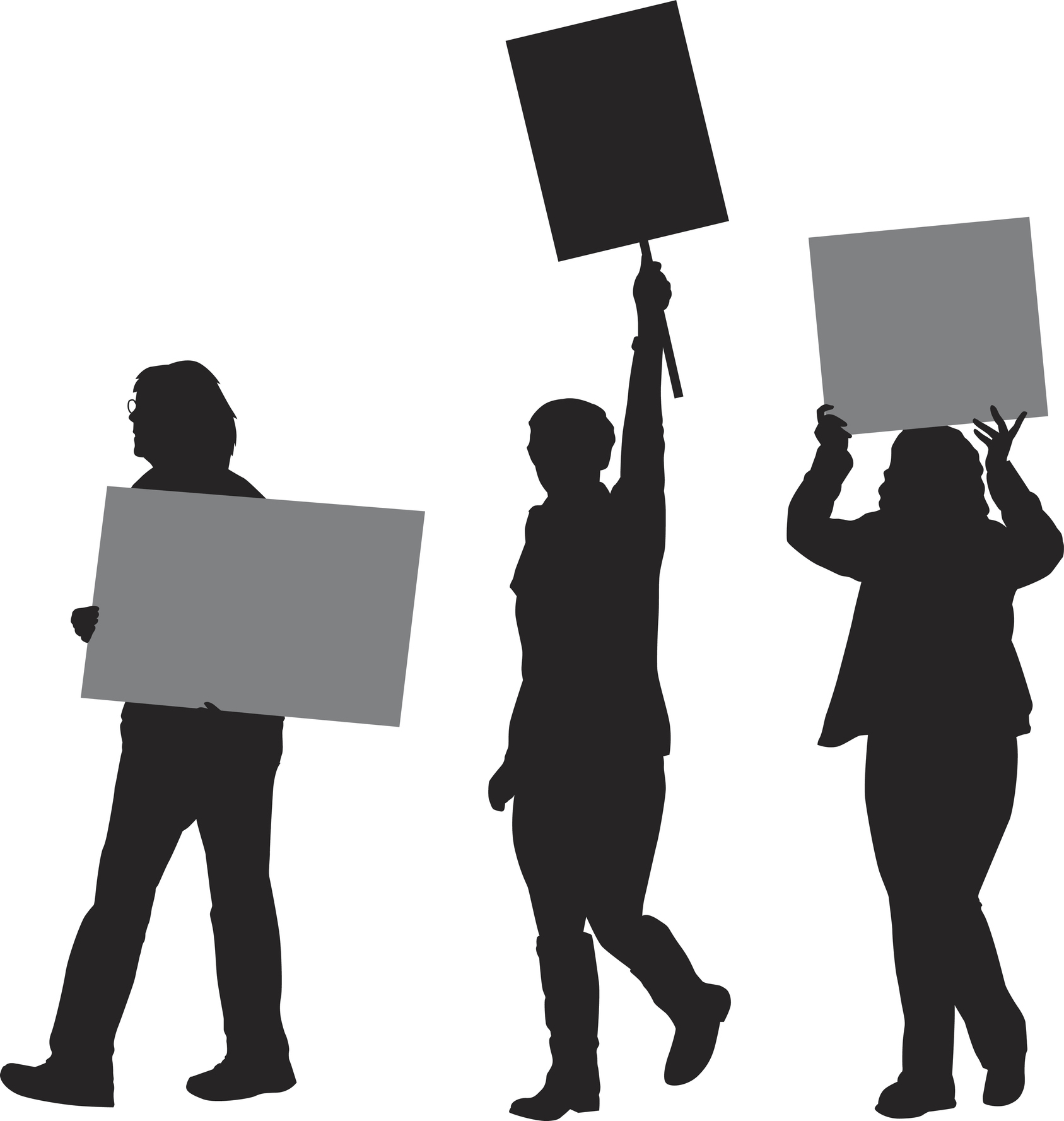
Image via Getty Images / RobinOlimb
Epstein: I know we both also wanted to mention an organization called Movimiento Cosecha, which means harvest movement literally, and is advocating on the behalf of the 11 million or so undocumented immigrants in this country. They’ve been a big part of these efforts.
Friedman: And all the protests were coordinated with Cosecha. I think [the power of the protest] was the combination of us as Jews and them as immigrants, and then here I want to stop and say, those are not mutually exclusive categories. And at the rally we heard from Jewish people who are also Latinx immigrants.
Epstein: Like my mother. [See my comments in the intro to this interview.]
Friedman: The moral authority of a bunch of Jews saying “never again” only works when paired with and in service to amplifying the voices of this incredibly powerful immigrant-led movement. And I really hope that people check Cosecha out because they’re doing incredible work.
They have two very specific campaigns. One is about making it so that in your community, undocumented people who often don’t have access to drivers licenses won’t get arrested for driving without a license. We’re working on that in Boston with the DA; there are [similar] local efforts across the country that Cosecha is leading, something folks [can] get involved in.
Think about not being able to drive without being afraid of being arrested and deported because you don’t have a document that you’re not permitted to get. You can’t do anything in many communities, without being able to drive.
The other [Cosecha campaign] is about knowing which businesses are in fact supporting or doing business with ICE and not fucking doing business with them.
Epstein: There [was] a protest in New York City on Monday, July 8th: to tell Palantir “to disarm ICE and stop aiding and abetting Trump’s anti-immigrant agenda.” Palantir is a software company whose mission statement is, Palantir “builds software that connects data, technologies, humans and environments.” It was founded by a number of people including Peter Thiel, and Joe Lonsdale.
Friedman: What are they providing to ICE?
Epstein: Essentially they are technical support for the process of tracking and detaining undocumented immigrants. Then Amazon web services is hosting, and much has been made of a protest in Boston not too long ago by workers at Wayfair.
Friedman: I loved that protest.
Epstein: Wayfair seems to have taken a serious hit, in terms of its PR standing and ability to retain what are considered in the tech industry to be its all-important, highly skilled engineer and design employees.
Friedman: Good.
Epstein: My point is, the tech industry is involved in this issue of immigration. Farhad Manjoo at the New York Times has written about “why Silicon Valley wouldn’t work without immigrants,” and in a future TechCrunch piece I plan to talk to Cornell professor Louis Hyman, who has written about how “undocumented workers have been foundational to the rise of our most vaunted hub of innovative capitalism, Silicon Valley.”
Friedman: I don’t know if this is too radical for TechCrunch, but of course there are connections there, because the connection is capitalism. Unfettered, unregulated capitalism is underneath all of this.
A lot of those camps are for-profit, run by for-profit companies making a fortune on torturing people and kidnapping children. And any company that wants to keep wages low hires undocumented workers or immigrants, even if they have documents, who are hungrier for jobs or have fewer options. [We need] to talk about the profit motive for all this human suffering.
Epstein: I don’t consider that too radical for TechCrunch.
Friedman: Okay, good. I don’t want to shut people’s minds closed so that they don’t hear the rest of the interview, but this is in part a story about choosing profit over humans.
Epstein: Western “developed” economies continue to have these struggles around immigration because the economic model we’re living under continues to need extraordinarily cheap labor.
Friedman: And, in order to distract us from that, they pit us against each other, right? The owers that be leverage racism and xenophobia to say, it’s not us oppressing and [exploiting] you, even though it is. It’s those other people, taking the job from you, taking money from you. You should hate them, and like me.

Image via Getty Images / alashi
Epstein: On the other side of things: how was tech used positively, to spread the word, mobilize people, persuade people?
Friedman: The only way this series of actions would have come together as quickly as it did was using digital communications. I found out about it on Facebook, if I’m being honest.
We used Google docs to figure out what we needed, and we used secure messaging apps to plan things. We also leveraged social media I think quite smartly to get the word out about the action.
The video of our arrest, that my partner sent out from my Twitter account, has been seen half a million times. And other people did their social media too. The ability to amplify these messages to people who are not tuning in to their local evening news, really can’t be underestimated.
Technology is neither good nor bad, it’s gasoline. Digital technology amplifies, fuels, every human impulse. It’s on us as humans to make sure the good outweighs the bad.
Friedman: Another thing I want to say, and this isn’t about tech specifically, but I think it’s really important to point out: we were arrested for trespassing. A misdemeanor. The charges were dropped. But crossing the border without legal permission from the United States is also a misdemeanor.
It’s a federal misdemeanor, not a state misdemeanor, but it’s the same class of crime. We were released without charges, and immigrants who do that are being held in concentration camps and having their children kidnapped.
One of the number one things I heard from concentration camp defenders, let’s call them, is ‘these people broke the law, and if they don’t want to be treated like this, they shouldn’t have broken the law.’ That’s not true, many of them are asylum seekers, and seeing asylum is not illegal. But even for the ones who have broken a law, they committed a misdemeanor, literally.
For example, another federal misdemeanor is running a stop sign at the Pentagon. It’s the same level of crime. If people think it’s cool for us to take their children if they run a stop sign at the Pentagon, I’d like to hear that, but I don’t think they do. So I think it’s important to point out how we were treated for a misdemeanor, in stark relief against how immigrants are being treated for the same class of quote-unquote violation.
Epstein: I know you wanted to keep the focus of this interview squarely on the protest and the reasons for it. Now that we’re almost done, I just want to ask for a two-minute comment from you about other ways in which your work on sexual ethics has involved the tech industry.
For example, in your most recent book, you have really interesting things to say about Pornhub, the online porn industry and how technology is used in that way. Could you give readers a little insight from that work, since they’re encountering you here?
Friedman: I’d rather, if it’s okay, talk about Facebook than talk about porn, because I feel like it’s going to distract from the interview if I start talking about online porn.
Epstein: No problem. Do you mind if I keep that explanation in though?
Friedman: That’s fine. I love talking about the ethics of online porn. I just don’t want that to be the headline of this interview, and porn tends to eclipse everything else.
Epstein: Of course.
Friedman: Also in that book [Unscrewed], I wrote about how Facebook has a rule that you can’t buy an ad to promote the idea that sex feels good. [That] means you can run an ad for condoms that says, you should wear condoms otherwise you’ll get a disease and your dick will fall off.
You cannot run an ad that says you should buy condoms because when you’re not worried about catching disease, you and your partner can connect better and sex feels better. It’s an astonishingly immoral rule, and I genuinely don’t know the reason for it, though I can only guess that it is for conservative business reasons, just not wanting to scandalize sponsors or stakeholders of some kind, or have the misperception that people like to talk about sex on Facebook, God forbid.
[So] there are an enormous number of sexual health-related organizations, both non-profit and for-profit businesses, who are trying to get desperately needed sex education out to folks who have no access to it, who cannot promote their work on Facebook. Which is the largest way to communicate with people in the world, basically.
And that’s just the starting point. Tumblr, going back to porn, recently banned anything it perceives as sexually suggestive or explicit, and Tumblr until then was a place that especially young women found sexual information that centered them.
On Instagram, you can have a male nipple but not a female nipple. What does that even mean, and how do they even know what the gender of a nipple is, right? And what does that mean for trans folks and gender queer people and non-binary people, let alone everybody’s self-expression?
Our public squares are now privately owned, which of course is not new. But that effects sex educators’ ability to reach sexually marginalized folks who desperately need reliable information that affirms and helps them understand and have sovereignty over their bodies.
We don’t lack access to stigmatizing, misogynistic racist transphobic hyper-sexualized images. If Facebook and Tumblr ban them, they’re everywhere. When the tech companies crackdown on them is it’s actually marginalized communities who lose access and who are harmed.
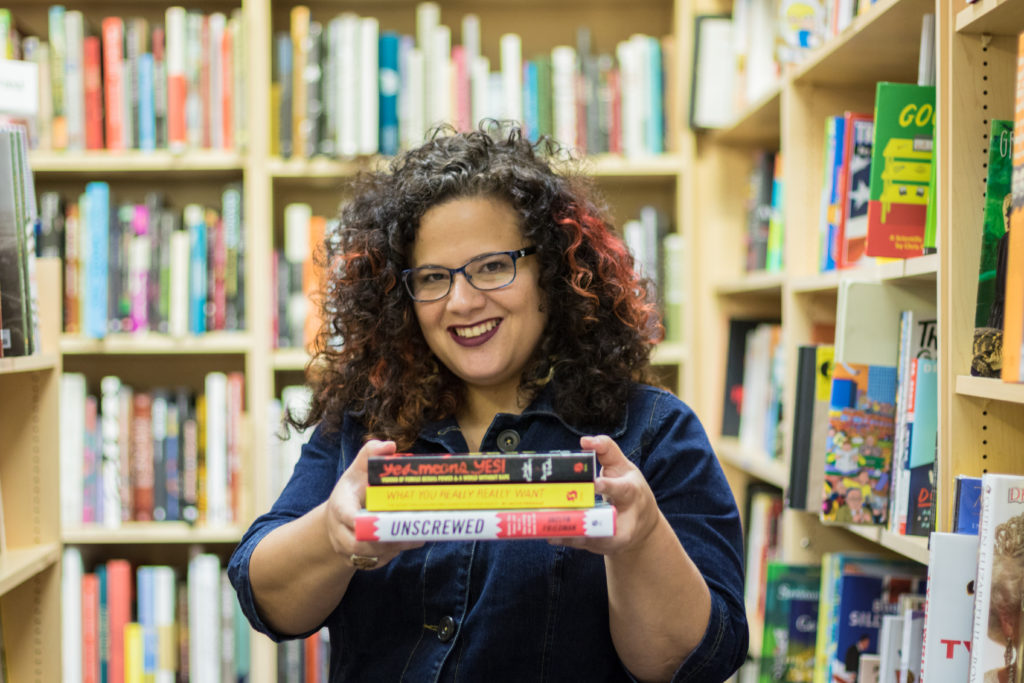
Epstein: Very interesting. As I always conclude these interviews: how optimistic are you about our shared human future?
Friedman: I relate to that question not from an emotional place but from a strategic decision taking place. Much in the vein of Rebecca Solnit’s book Hope in the Dark. So the reality is, I genuinely don’t know about our human future. But I know that if I give up hope, it makes it harder for us to have a human future worth having. And that if I decide to act from hope, it makes it more possible that we will.
Epstein: Thanks so much.
Look for a follow-up interview coming soon with Cornell University Professor Louis Hyman, who has written about how “undocumented workers have been foundational to the rise of our most vaunted hub of innovative capitalism: Silicon Valley.”
